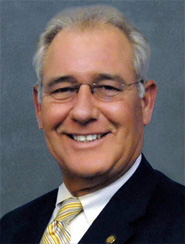Senate Panel, Headed By Evers, Looks For Death Penalty Fixes
January 29, 2016
A Florida Senate panel chaired by Greg Evers heard Wednesday from prosecutors, judges, public defenders and experts about how to fix the death-penalty process after the U.S. Supreme Court struck down the state’s capital sentencing structure this month.
The Senate Criminal Justice Committee workshop focused on the impact of the decision, known as Hurst v. Florida, which found the state’s system of allowing judges — not juries — to impose the death penalty is unconstitutional.
Much of the testimony from defense lawyers, judges and prosecutors also dealt with issues related to but not explicitly addressed in the Jan. 12 ruling.
The 8-1 decision was centered on what are known as “aggravating” circumstances that must be found before defendants can be sentenced to death. A 2002 U.S. Supreme Court ruling, in a case known as Ring v. Arizona, requires that determination of such aggravating circumstances be made by juries, not judges.
Under Florida law, juries make recommendations regarding the death penalty, based on a review of aggravating and mitigating circumstances, but judges ultimately decide whether defendants should be put to death or sentenced to life in prison.
Florida law also does not require that the jury recommendations to impose death sentences be unanimous, making the state an “outlier” compared to others with capital punishment, Bob Dunham of the Washington, D.C.-based Death Penalty Information Center, told the committee.
While Florida only requires a simple majority recommendation from juries, Alabama and Delaware — the only other states that do not require unanimity — both require at least nine jurors to vote in favor of capital punishment.
Being so outside of the mainstream puts Florida at risk in a future Supreme Court ruling, Dunham said.
Nearly all of the speakers Wednesday recommended that the Legislature require unanimous verdicts in death penalty sentences, as is required for all other verdicts under state law.
Capital Collateral Counsel for the Southern Region Neal Dupree said the lack of unanimity is “disconcerting” in death sentences.
“We require a jury to be unanimous in every other aspect of law, why shouldn’t a unanimous jury be required in this instance?” said Dupree, whose state-backed agency represents Death Row inmates.
O.H. “Bill” Eaton, a retired Florida judge and death penalty expert, told the panel that requiring unanimous verdicts in death penalty sentences would require jurors to be more deliberative.
“When you have a unanimous verdict, everybody’s got to work and they’ve got to come to grips with a decision,” Eaton said.
But Brad King, the state attorney for the 5th Judicial Circuit, which includes Ocala, said unanimous verdicts should be required for decisions regarding aggravating circumstances but not for whether the death penalty should be imposed. King suggested that 9-3 decisions for sentencing would suffice.
Allowing one juror “with no qualifications” related to the death penalty to prevent a death sentence would “give them absolute control over what that sentence is,” King said.
“You allow them to control the entire process,” he said.
 Evers, who represents the North Escambia area, assembled the speakers and asked them to make specific recommendations to the Legislature about how to fix the problem with the sentencing process.
Evers, who represents the North Escambia area, assembled the speakers and asked them to make specific recommendations to the Legislature about how to fix the problem with the sentencing process.
Florida Solicitor General Allen Winsor, who works for Attorney General Pam Bondi and who argued the Hurst case before the U.S. Supreme Court last fall, told the committee that his office did not have any suggestions about how the state should respond.
“You’re really not going to give us any recommendations?” Evers said.
Under questioning from Senate Minority Leader Arthenia Joyner, Winsor remained reticent.
“What he’s going to do is he wants us to come up with the decision and then they’re going to work with us on it,” Evers, R-Baker, said.
Lawmakers are also grappling with whether the Hurst ruling should apply retroactively to already-sentenced Death Row inmates, something the U.S. Supreme Court did not address in its ruling.
Dupree is representing Cary Michael Lambrix, a Death Row inmate scheduled to be executed on Feb. 11. The Florida Supreme Court will hear oral arguments in the case, including the impact of the Hurst decision, on Tuesday.
Dupree said Florida lawmakers should follow their own example in a 1972 law passed in anticipation of a U.S. Supreme Court decision in a case known as Furman v. Georgia that resulted in a nationwide moratorium on the death penalty. The law, still on the books, required that all death sentences be reduced to life imprisonment if a U.S. Supreme Court decision finds that the state’s death penalty statute is unconstitutional.
Sen. David Simmons asked the panel whether the 1972 law would have to be applied in the wake of the Hurst ruling, but received mixed responses from the experts.
Evers said the Senate will pass “some type of death penalty reform” during the legislative session. After the meeting, he said he intends to propose a measure that will require juries to impose death sentences and that it will also address how many jurors must decide on the sentence.
“I can’t guarantee it will be unanimous, but the numbers will change,” Evers said. “We’re going to look at it to where we don’t have to come back here and we can put Florida’s death penalty to rest.”
by The News Service of Florida



Comments